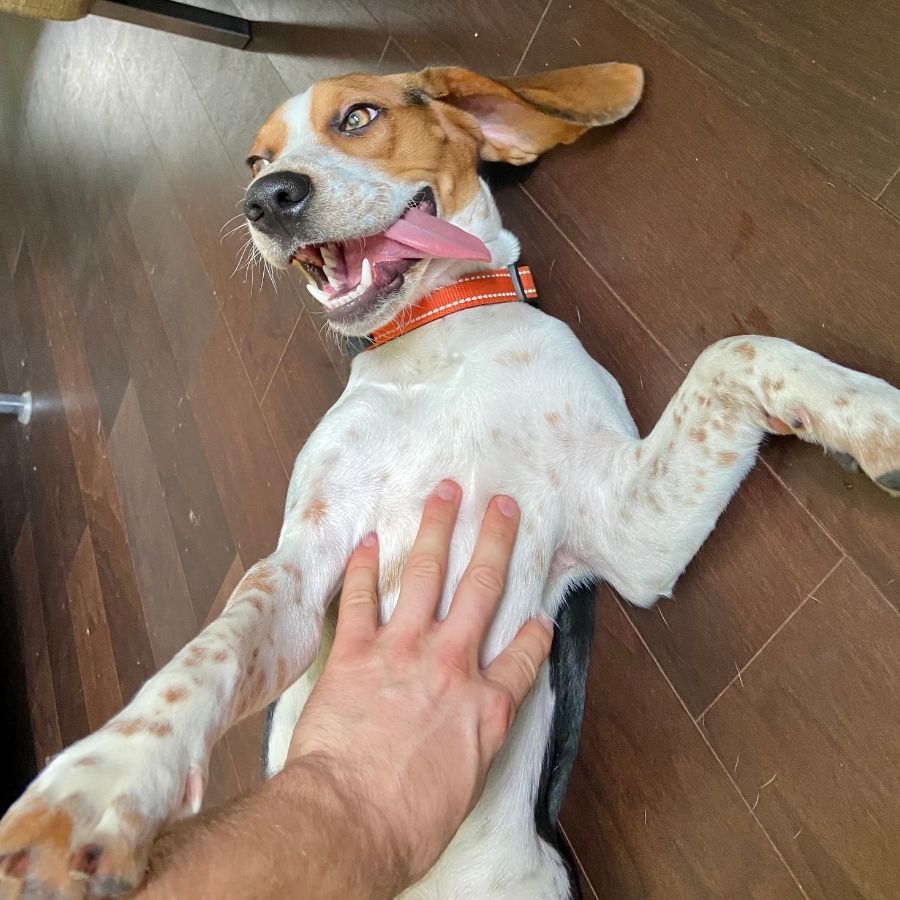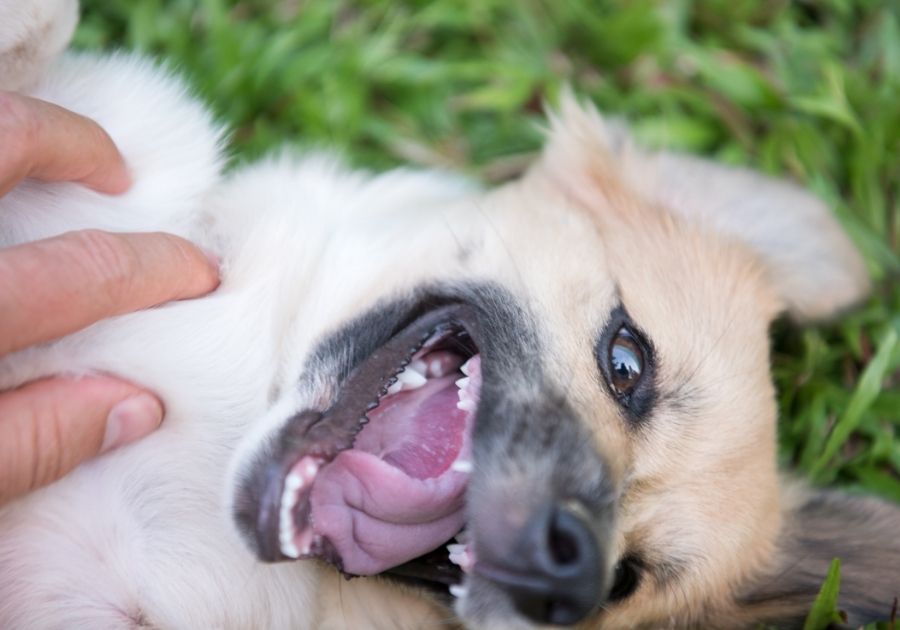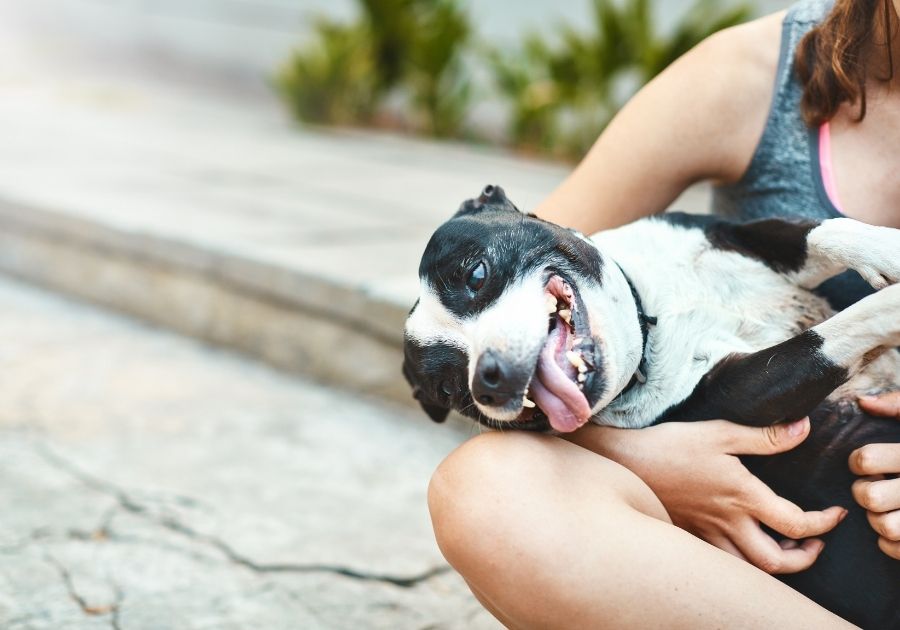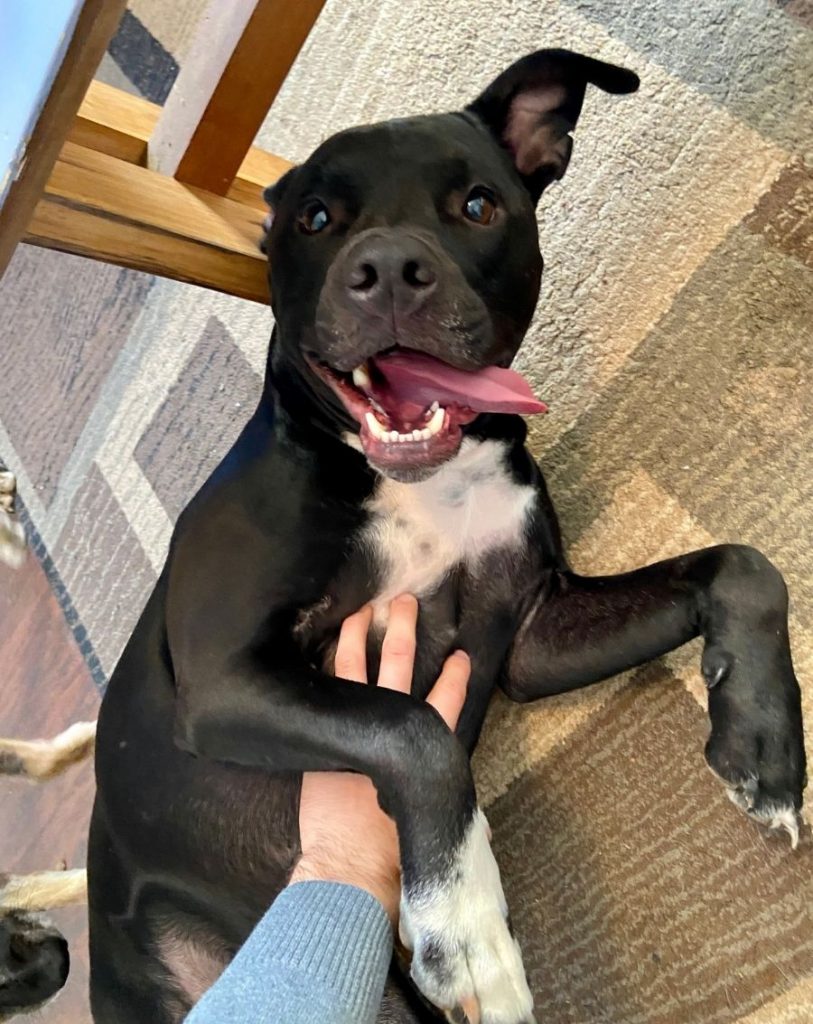Every pet parent knows just how much dogs enjoy a good belly rub, but sometimes, you might unintentionally pet a certain area that makes your dog act a little out of character.
Whether you gently rub their back and they lean comfortably into your hand, or you stroke their ear lightly and they start twitching it excitedly, there are certainly different sensations and reactions to different spots.
Other times, it can really look like they’re acting ticklish.
But are dogs ticklish, really? If they are, where are dogs most ticklish?
If you’ve ever been curious about why your pup loves belly rubs or if they even feel ticklish at all, you’re not alone.
That’s why this article explores the possibility for dogs to be ticklish and we’d love to go on this journey to discovery with you!
Are Dogs Ticklish?

The short answer is yes! Absolutely! Dogs can really be ticklish. The tickle response, also known as gargalesis, is proven to be present in human beings and other animals like primates and rats, and it has been discovered that dogs just might have this reaction to tickling and light touches too!
Where Are Dogs Ticklish?
Just like how certain people only seem to have ticklish feet and aren’t ticklish anywhere else, you’ve probably wondered “are dogs most ticklish in a particular spot, or are they really ticklish everywhere?”
If you’d like to know that spot a dog is most ticklish at, there are some places you might want to try that are most definitely going to be ticklish and sensitive.

As a matter of fact, your dog’s most ticklish spots are very similar to the common ticklish spots in human beings.
Possible spots where your pup is ticklish include:
- Underarms
- Neck
- Paws
- Ears
- Their back (particularly above their tail)
Why Does My Dog Kick His Leg When I Scratch Him? Is He Ticklish?
Not exactly! Certain canines have a couple of spots on their body, which when scratched causes them to tense up a bit and start kicking their hind leg.
People refer to these as tickle spots, but it’s simply a sensitive area that is connected to a somewhat similar reaction, and not necessarily a sign that they are ticklish.
If you’ve ever come across a spot like this on your canine buddy, you may have noticed them react by kicking their leg and thumping their foot as though they’re scratching in mid-air, and that’s typically what they’re doing.
You can call it a scratch reflex, and you should know that your dog has no control over it.
Humans have a similar reaction to this, and it’s called knismesis.
This reflex is completely involuntary and works similarly to when you hit your knee and jerk your leg.
The nerves under the skin are stimulated by the scratching sensation thereby sending signals to their spinal cord.
This basically translates as an alert that something is causing their skin to itch.
The dog’s nervous system responds by sending an impulse back, informing the leg to scratch the itch and kick away whatever the cause of the problem is, alerting their muscles and causing them to start scratching.
The point is, you’re already scratching that itch, so they end up kicking the air a little.
Do Dogs Laugh When They’re Tickled?

Humans are known to laugh when they get tickled (usually along with screams of “Stop!”).
It’s a similar phenomenon with other animals like rats and apes as they’re known to make a noise that sounds like laughter whenever they’re tickled.
But do dogs laugh when they’re tickled?
Well, it doesn’t exactly sound like giggling and we aren’t sure if it’s laughter in the same way that we humans look at it.
But dogs can make a similar sound to laughter, especially during playtime.
This sound can be likened to panting, but when analyzed, the frequency of this laughter is quite different from doggy panting.
If your dog opens his mouth in a wide doggy grin and starts panting while you tickle away, it’s likely that they’re really laughing. But we might never be certain!
In any case, that warm doggy smile is as real as a human grin.
If your pup squints his eyes or they’ve got a tender gaze, their jaws are open with no pressure, their tongue dancing happily, and lips pulled up at the corners in the shape of a smile, best believe your canine companion is feeling happy and relaxed.
What Makes Dogs Ticklish?
It has everything to do with their nerves, similarly with humans.
One thoughtful step to take might be to try and ponder over why exactly dogs are ticklish and then draw a comparison right there.
If someone tickled you under your foot, you would typically giggle and shove it off.
This reaction can be likened to if you touched something that causes you pain, like pricking your finger on a needle or touching something hot.
Touching an object that could cause you harm triggers the contraction of your muscles, and by instinct, you jerk your hand or foot away as quickly as possible.
Due to how similar the defensive response and that of tickling are, there is a theory that when a person is ticklish, it’s simply a defense mechanism.
This is due to the fact that most tickle spots in the body are typically soft, susceptible areas like your underarms or the soles of your feet.
So if you or your fur baby feels some type of way on these sensitive spots, they respond, and so appear ticklish.
Is It Bad To Tickle A Dog?

It’s mostly depended on your dog’s reaction. You probably know how upsetting and even aching tickling can be, and sometimes, you just aren’t in the mood. It’s basically the same for dogs!
Your dog might love to be tickled while other dogs simply do not want to be bothered.
Your dog might sometimes not be in the mood. Other times, the tickling drags on for much too long and gets them upset.
If your dog seems happy and relaxed while you tickle him, he definitely doesn’t mind.
If your pooch goes further to lean into your hand while you tickle away, that’s a clear sign that he enjoys what you’re doing and wants you to continue.
However, if your fur baby shows signs of provocation, unhappiness, or general indifference, do not force it or even try at all.
Walking away from you is a clear sign that they have no interest in what you intend to do.
Also, if your dog snarls or growls while you tickle them, they’re definitely uncomfortable with tickling and would prefer you let them go immediately.
Conclusion
Experts say that dogs are not ticklish in the same way we humans feel being tickled.
But we’re pretty sure your fur baby getting enjoys belly rubs and is excited whenever you touch him.
However, not every dog likes to be tickled, and while some might endure it, others will make it clear that they’d prefer you stopped bothering them.
Understand your pooch’s body language and try to act accordingly. It isn’t always a good thing if your dog is ticklish though.
If your dog’s skin has suddenly become more sensitive, it might be something to be worried about.
And in the event that your dog becomes itchy and ticklish all of a sudden, it could mean that they have dermatitis, dry skin, fleas, or something even more serious irritating their skin.
You should check your pooch for any signs of rashes, parasites, sudden illness, and consider an appointment with the vet as soon as possible.







